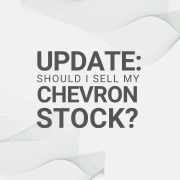Update: Should I Sell Some of My Chevron Stock?
With Chevron’s (CVX) stock price hovering around $185 (as of 11/22/22), I’ve been actively calling my clients to vet their interest in selling stock to diversify their portfolios.
It’s worth noting that we’re not talking about Employee Stock Ownership Plan (ESOP) shares, which are tax advantaged. Those are generally advisable to hold onto long-term.
But when it comes to shares of common stock, this might be the time to sell — or at least take a little off the top. It’s tempting from a psychological standpoint — i.e., recency bias — to want to stick around and see how long the stock price climbs. But you have to be willing to ask yourself the “what ifs:”
- What if the war in Ukraine ends?
- What if Chevron shares go back to $100 as a result of oil prices dropping?
- How would I feel if I held out thinking the price was going to hit $200, and it drops back to $100?
In this blog post, we’ll unpack these questions, as well as share considerations for your decision.
How Will You Feel?
One of the most important questions to ask yourself is how you’ll feel in these what-if scenarios. Sure, Chevron’s stock price could keep going up and make you more money when you sell. But what if it doesn’t? What if the war ends and it drops to $100 overnight? Will you still be able to retire when you want to?
We all tend to have a very short memory span. It wasn’t that long ago that the global economy was going haywire due to Covid. Chevron stock was at $59 a share, because oil wasn’t worth anything. People weren’t traveling, and there was no place to store the oil.
If another wave of Covid hit or the war in the Ukraine ended — where would Chevron be? If the stock price plummeted back below $100, you might be kicking yourself. Or, worse, you may have to work several more years than you planned before retirement.
What Do You Fear?
If you’re confident that you could still retire on time, even if Chevron stock went back to $100, that’s fine. But most people would rather diversify now than risk having to work another five years.
Even if you’re confident that Chevron’s stock price will stay elevated, think about Apple and Amazon. As strong as those tech giants are, their stocks have taken big hits over the years. If employees had all their retirement savings invested in those companies, any one of those stock hits could have drastically slashed those employees’ savings and postponed their retirement dates.
Visualize the What-Ifs
If you don’t have a good sense for whether or not you could retire, it might be time to do some scenario planning. Ask your advisor to conduct a Monte Carlo analysis to help you understand different scenarios. Monte Carlo simulations essentially run hundreds of different scenarios to help you understand the probability of successfully reaching your goals (retirement or otherwise) in the midst of unknown variables.
Another visual that can be helpful is to think of your stock in “chunks” to sell. We can help you put together a plan to sell a certain percentage of your stock over time. That way, you can still capture some of the upside if the stock continues to climb, but also protect yourself if it plummets.
You don’t necessarily need to sell all your Chevron stock, but it’s a good idea to at least start diversifying. We would recommend putting your money to work in both the stock and bond markets and can recommend a model portfolio for you that suits your needs, timeline, and risk tolerance. Diversification is key to making sure you stay on track with your goals and can retire when you want.
As you can tell, your decision about whether or not to sell your Chevron stock doesn’t have to be black or white. If you want to explore options, just want to talk through your situation, or would like to run a Monte Carlo simulation to help with scenario planning, we’re here to help in whatever way we can.
If you’d like to chat, please click here to schedule a complimentary consultation with me.

Len Hanson
Wealth Advisor, Warren Street Wealth Advisors
Investment Advisor Representative, Warren Street Wealth Advisors, LLC., a Registered Investment Advisor
The information presented here represents opinions and is not meant as personal or actionable advice to any individual, corporation, or other entity. Any investments discussed carry unique risks and should be carefully considered and reviewed by you and your financial professional. Nothing in this document is a solicitation to buy or sell any securities, or an attempt to furnish personal investment advice. Warren Street Wealth Advisors may own securities referenced in this document. Due to the static nature of content, securities held may change over time and current trades may be contrary to outdated publications. Form ADV available upon request 714-876-6200.










